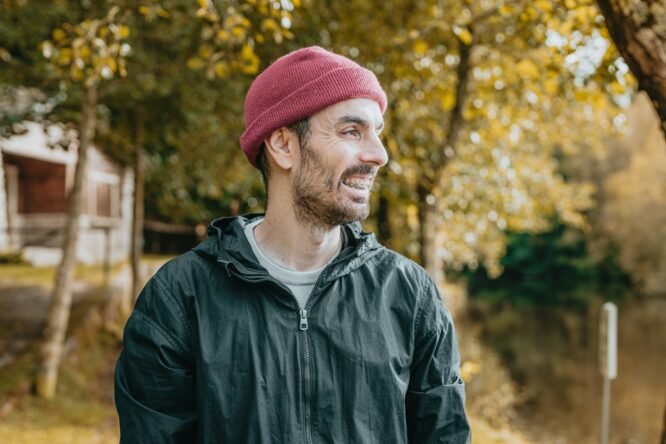We all get caught up thinking about the past sometimes—we’re only human.

Sometimes it’s a positive thing, like when we’re feeling nostalgic and reliving happy memories; other times, it’s when we’re wallowing in regrets and past traumas that we’ve never quite been able to move on from. Either way, moving through life with your gaze behind you rather than on the path ahead doesn’t do you any favours. People who focus on living in the present moment and building a better future know this all too well, and they’re much happier as a result.
1. They let go of the past once and for all.

When someone refuses to cling to old mistakes or regrets, it frees up their mental energy for what’s happening right now. They see no point in replaying moments that can’t be undone because that only stirs up guilt or frustration. By cutting ties with yesterday’s baggage, they create space for fresh goals and spontaneous opportunities in the present.
In letting go, they’re not ignoring their history; they’re simply refusing to let it define who they are today. Each experience, good or bad, becomes a stepping stone for growth, not a prison they’re stuck in. This mindset pushes them forward rather than pulling them back, making their day-to-day life feel more open and optimistic.
2. They focus on what they can change now.

People who never look back pour their energy into things they can actually influence instead of brooding over old outcomes. They know that worrying about the past won’t alter it, so they’d rather spend time on projects, relationships, or plans that can still be shaped. It’s like funnelling all that mental fuel into something constructive, rather than letting it burn up on dead-end “what ifs.”
This approach gives them a sense of control over their own path. Instead of letting regrets fester, they channel that emotional charge into current tasks, like trying a new workout routine, learning a language, or improving their workspace. By keeping their hands and mind busy in the present, they build momentum that’s much more satisfying than replaying days gone by.
3. They find lessons fast and move on.

A key part of not looking back is extracting what you need from a mistake or disappointment, then bouncing forward. They treat errors as data points rather than personal failings, asking themselves, “What can I learn for next time?” That question guides them toward practical takeaways, cutting out hours of wallowing.
Once they have their lesson, they don’t linger on the embarrassment or guilt. They forgive themselves quickly because dragging that baggage around only slows progress. That fast turnaround helps them avoid repeating the same missteps, while also making them more resilient when life inevitably throws another curveball.
4. They embrace each day’s fresh start.

Waking up to a new morning feels extra refreshing for people who don’t dwell on yesterday. Instead of replaying old slip-ups, they see the sunrise as an automatic reset button for their mindset. This daily blank slate fuels their excitement to try something different—maybe a new recipe, a different route to work, or an overdue conversation.
Being free from yesterday’s emotional weight also makes them more adventurous. They’ll experiment, test out ideas, and say “yes” to random invites because they’re not bogged down by thoughts like, “Last time I tried something new, it didn’t work.” Each day is a mini adventure, unburdened by regrets that could sap their sense of fun.
5. They keep anxiety in check.

Lingering on past mistakes often blends with worrying about the future, creating a heavy load of anxiety. But people who avoid looking back don’t allow old screw-ups to bleed into new fears. They see problems as isolated events, not proof that they’ll always mess up.
That perspective helps them tackle challenges with a calmer, clearer mindset. Sure, they might feel butterflies when facing something tough, but they don’t drag old fiascos into the equation. This lighter mental approach generally leads to lower stress and a more positive attitude when confronting hurdles.
6. They know they’re not the same person forever.

We grow with every experience, so why stay trapped in a version of yourself from five or ten years ago? People who skip the backward glance understand they’ve evolved, which means old behaviours or choices don’t necessarily define them now. They can outgrow past patterns, forging a future that doesn’t repeat mistakes of the past.
That mindset encourages self-reinvention. Instead of saying, “I’ve always been bad at maths” or “I’m just the type who can’t speak in public,” they believe they can shift those narratives if they choose. Not dwelling on how they used to be leaves room for who they can become.
7. They forgive themselves and other people more easily.

When you’re not replaying every slight or heartbreak, grudges lose their grip. People who look ahead see forgiveness as a form of self-care—it stops negative emotions from piling up. Holding on to resentment or shame is just extra weight, so they let it go to stay emotionally lighter.
They realise everyone, including themselves, is bound to slip up. By choosing empathy over bitterness, they maintain stronger bonds with friends, partners, or colleagues. This doesn’t mean they ignore real issues; it means they address them, learn what they can, and refuse to carry anger forward.
8. They stay open to fun experiences.

Sometimes, past disappointments can poison your willingness to try again, whether it’s a failed job interview or a bad relationship. But these people manage to dodge that trap, and each new invitation or opportunity stands on its own merits.
With fewer mental hang-ups, they jump at chances to travel somewhere new, attend a random event, or simply hang out with people they’ve never met. They know life’s short, and letting old experiences spoil fresh possibilities is a sure way to miss out on the excitement that keeps life interesting.
9. They move through heartbreak quicker.

A breakup or a falling-out with a friend can hurt like hell, but fixating on how it ended rarely brings closure. People who refuse to dwell see heartbreak as part of life’s inevitable ebb and flow. They allow themselves to feel the sadness, but they don’t pitch a permanent tent in that emotional zone.
Once they acknowledge the pain, they flip their focus to rebuilding, maybe diving deeper into hobbies, forging new connections, or dedicating time to self-improvement. Doing so steers them away from the endless replay of what went wrong and pushes them toward a healthier, happier state faster than if they kept ruminating.
10. They manage disappointments with perspective.

When something goes south—a lost job, an unkind comment, a failed exam—they treat it like one bump in the road, not a verdict on their entire life. They know that fixating on “should have done this” or “if only I’d done that” just drags out the misery.
Instead, they zoom out and see the bigger picture. Sure, it stings now, but it’s not the end. They’ll take a step to fix things or explore a new direction, reminding themselves that a single setback doesn’t invalidate all their progress or potential.
11. They invest in future goals.

Without a constant loop of old regrets, these folks channel their imagination into what’s next. Maybe they plan a career pivot, start saving for a house, or finally sign up for that half-marathon. Whatever it is, looking forward keeps them energised and optimistic.
They see goals not as a risky bet, but as an adventure that can evolve. If the plan changes mid-stream, they adapt. Because they haven’t anchored their self-worth in a past version of themselves, they’re more fluid about trying new paths and switching strategies when needed.
12. They embrace their evolving identity.

Clinging to who you were can trap you in a loop of “I was always X” or “I never do Y.” But people who skip the rearview realise they can change beliefs, tastes, and habits with time. They let their interests expand, whether that’s developing a passion for painting or deciding to run a small business.
That evolving identity sparks curiosity; they’ll explore new topics or pick up random skills just because it feels fresh. They’re not bound by old expectations, so they rarely limit themselves with phrases like, “I’m just not that type of person.” They allow themselves to change course whenever it feels right.
13. They see challenges as stepping stones.

When a hurdle appears, they aren’t weighed down by past failures that might whisper, “You couldn’t do it before; you can’t do it now.” Instead, they treat each challenge as a new puzzle to solve. They might recall lessons from the past, but they don’t let those define their capacity to succeed now.
This forward-leaning stance transforms obstacles into opportunities for growth. They’re more likely to approach problems with a creative eye, testing new methods or solutions. It’s an attitude of, “Well, let’s see how this goes,” rather than “Here we go again, repeating history.”
14. They share positivity with people around them.

Negativity can be contagious, and so can positivity. By not dragging around old bitterness, these folks often radiate a friendly, open vibe that other people tend to find refreshing. They encourage forward motion in friends or coworkers, subtly nudging them away from dwelling on things they can’t fix.
This doesn’t mean they’re blindly cheerful all the time. They just default to “Let’s keep going” instead of “We’re stuck in the past.” People sense that uplifting energy and tend to respond with warmth, making social connections easier and more genuine.
15. They create a sense of personal freedom.

Ultimately, steering clear of constant backward glances grants a sense of freedom. They aren’t tethered to who they were or mistakes that once seemed defining. They can try, fail, and reinvent without feeling permanently labelled by an old narrative.
This freedom feels like a wide, open horizon—no heavy regrets looming, just a readiness to seize whatever fresh chance appears. Each day can start with the thought, “What am I going to do next?” instead of “Ugh, I wish yesterday went differently.” And for many, that’s the key to feeling truly alive.




